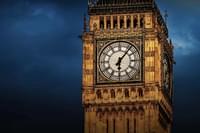
Brexit: the coup continues apace
Public trust is essential in delivering political change. Without such trust a fundamental covenant is broken and legitimate change moves in the direction of coup d'état, says Sean Walsh.
Last of the Summer Wine was a piece of television whimsy which followed the antics of a trio of pensioners with too much time on their hands, making mischief in a world that ran merely in parallel with our own. At the end of each episode they would construct a contraption of intense aesthetic offensiveness which they would then test-drive down a hill and crash into a ditch.
The next week, having acquired a taste for it, they would do exactly the same thing again.
For some reason I was reminded of all this while watching Liz Kendall on the Daily Politics last week. Ms Kendall is proposing that a "citizens' assembly" be established and charged with determining the question to be posed in the Remainers' alchemical second referendum. The composition of any such assembly would be determined by some mechanism of "random selection", she announced with improbably straight face. When questioned further Kendall opted to wrap her suggestion in layers of ever-increasing complexity, so much so that we might think of it as the "take away the number you first thought of" proposal. Ms Kendall thinks that the details of all this could be sorted out in six weeks. Compo and his friends have the jump on her there, as their own monstrosities were cobbled together in an afternoon. That difference aside, Ms Kendall has road-tested her idea in the parallel universe of London SW1 and, as expected, has found herself in the ditch.
But she now has the taste for it so expect her to try again.
If reports are to be believed then, thanks to the efforts of Kendall et al, that parallel universe in which a second referendum is at least possible is being subtly merged with our own (in which it is not). This cannot be allowed to happen and those who oppose another vote need to raise their game and develop a strategy that does more than engage with the issues around process. They should argue, to put it simply, that a second referendum cannot be an option because a second referendum cannot be a referendum.
At the moment, the participants in the discussion of a second plebiscite -for and against- are making the same mistake. They assume that because an event has taken place in the past it cannot be alive with us now. This is understandable; it is a disposition of human psychology to work on the basis that past events are superseded by the opportunities of the present and future. There are, nevertheless, many types of past event that can operate a veto on the present, and the class of obligation is one of them. The result of the 2016 referendum is a living event in the here and now and therefore there is no conceptual space available for another one.
It is entirely possible, of course, for a government to introduce legislation that allows that, on a certain date, people are able to put a cross on a piece of paper. And it is possible to point at this event and call it a "referendum" in much the same way as it is possible for Compo to point at the bathtub-on-wheels next to him and call it a "car". Merely affixing a label to a thing does not, though, make it that thing. Philosophers distinguish between the real and nominal essences of a thing. What is the real essence of a referendum? Surely something like this: that it is a deliberated decision of an established polity in conformity with a principle of consent. A "second referendum" would not have this essence, for several reasons.
First, the Prime Minister cannot attempt a further vote without assassinating the live instruction of 2016 which then, like Banquo's ghost, will never really go away. Can you imagine the anger that this would unleash? And have you ever made a good decision when anger has been the principal actor in your decision-making process? We are told that a "second referendum" is desirable because the information which formed the basis of the decision in 2016 was incomplete. If she were to (again) go back on her word and acquiesce in the demand for another plebiscite Mrs May would then be obliged to explain the following: why is a referendum conducted on incomplete information inferior to one conducted in a context of outright fury? Another vote would have distilled within it the condign anger of all those who felt that the Establishment had confiscated their vote in 2016. This would be true a fortiori were Kendall's "randomly selected" citizen's panel to somehow contrive to offer a choice between two versions of Remain.
And this anger would serve also to make it impossible that a rerun would be grounded (as it must be) in a metaphysics of trust. Changes in our political dispensation are legitimate only to the extent that the institutional vehicles of such change can carry us with them. They can do that only to the extent that we trust them. When this covenant is broken then legitimate change moves in the direction of coup d'état.
The government recognises what it doubtless calls the "trust issue" but only as though through a glass darkly. It is reported that ministers are being briefed on strategies aimed at restoring faith in our political systems. But you cannot strategize trust any more than you can rehearse spontaneity. Trust is a form of spiritual capital and is irreducible to the shoddy managerial practices of our uniformly unimaginative political class. When trust evanesces then those who have forfeited it are not always best placed to manage its restitution. Such are the laws of spiritual physics.
The coup nevertheless is gathering pace, in part escalated by the machinations of the Tory Irreconcilables whose determination to filibuster their own manifesto commitments is now taking the form of constitutional vandalism. Their parliamentary consigliere is Dominic Grieve who, like Foggy, is the self-designated brains of the outfit. When Emerson spoke of an acquaintance that "the louder he spoke of his honour, the faster we counted our spoons" he might just as well have been talking about the former Attorney General. Mr Grieve speaks loudly and frequently of his concern for the proprieties of our unwritten constitution. This is humbug; Grieve has shown by his recent actions that his avowed concern for the niceties of the legislative process is no more than the shape of the Remainer meme which has colonised his soul. Mr Grieve's Beaconsfield constituency is the final resting place of G.K. Chesterton who once wrote that the way to love a thing is to be aware that at any time one might lose it. Grieve purports to love our constitutional dispensation. Why then is he prepared not merely to lose it but to throw it away?







